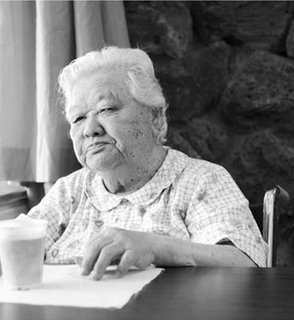 "When it comes to a child's legal duties to a parent, the courts are scarily unclear" notes a recent NOW Magazine article .
"When it comes to a child's legal duties to a parent, the courts are scarily unclear" notes a recent NOW Magazine article .When you review articles and studies on the challenges facing the elderly in our Canadian society the emphasis is almost always on assuring that the elderly are treated with respect, maintain the ability to choose their own care as long as they are capable and are free from abuse by family or caregivers. A worthy goal that we all support.
But what obligations and rights do the adult children have when elderly parents assert their independence to live alone in unsafe conditions when their physical and mental capacities are diminished? In my own experience, the adult children are placed very much between a rock and a hard place. They feel the responsibility to preserve their parents' health, safety and protection from predatory opportunists but lack any power to make decisions to protect their parents from harm. It is a life filled with stress and worry for the adult child, interspersed with unpredictable and disruptive crises.
No matter what relationship may or may not exist with the parent, nor physical proximity to the parent, the expectation of the health care network will be that the adult child will provide the support to prop up what may be a silly and dangerous choice by your aging parent to live at home. This can translate into a daily barrage of phone calls from all levels of health care support services, concerned neighbours, volunteer visitors and others. What rights do adult children have to say, "this situation is no longer supportable? It is unsafe for you and outside of my ability to sustain for you?" "It is time for you to move to a supported living environment?"
Absolutely none.
Neighbours and community supports may be over-taxed and concerned for your parent and advise that the elderly person be housed in a supportive environment. However the adult child is powerless to force this choice on the elderly person and must cope the best way they can.
Even when the hospital or caregivers decide that your elderly parent is unable to make appropriate choices for their accommodation, this is open to legal challenge by the elderly person and in my own experience, an elderly person who was unable to recognize their grandchild or remember what they had for lunch that day, or where they were, was able to be declared competent to make their own decisions by a legal panel.
Simply put, the adult child finds themself in a position where they are possibly legally obligated to assure the safety of their elderly parent but prevented from making any rational decisions to assure that safety. The result is a nerve-racking existence in which one waits for the next call about a debilitating fall, or dealing with fallout from the signing of some contract with a confidence artist, or phone calls from distraught neighbours who are concerned or aggravated by bizarre behaviour.
When leaving elderly parents to their own devices is viewed as abandonment, coercing them into supportive housing is viewed as usurping their rights, and community supports fail to meet the need, the adult child is left with a situation in which the only "right" option is to give up their own life and career to nurse the elderly parent. This is suggested by health care professionals at a surprising rate and women who assert their right to maintain a career in mid-life rather than nurse their elderly mother can expect to face at least some negative comments and guilt-tripping from their parents support network.
In a society in which we no longer demand that mothers interupt their lives to be fulltime caregivers to children, why are we placing adult children--usually middle-aged women-- in this situation, understanding that some elderly parents may live miles away from their adult children's communities and even have been estranged for years? Not all families are happy ones and not all adult children wish to care for parents that they may have no fond memories of.
In my view responsibility has to equal authority. If an elderly parent has the authority to make a decision to remain in their own home then responsibility for making that situation work has to remain with them. If an adult child is increasingly given responsibility to support the parent in the home, then authority should be ceded to that caregiver to enable them to make the decision to change the elderly parent's living situation when necessary.
The elderly person should have the authority to make decisions for themselves but not to impose those decisions in ways that adversely affect the lives, marriages and careers of their adult children, sometimes for several years of disruption.